|
|
|
Sort Order |
|
|
|
Items / Page
|
|
|
|
|
|
|
| Srl | Item |
| 1 |
ID:
178139
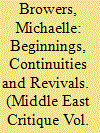

|
|
|
|
|
| Summary/Abstract |
This article examines some of the first translations of Gramsci into Arabic by young, New Left figures associated with a short-lived group called “Socialist Lebanon.” Thinking à la Edward Said about the undertaking of translations of ideas from one context to another and one language to another as a potentially productive act of beginning, I argue that these first translations, undertaken as part of a revolutionary praxis of young, militant intellectuals, not only reveal some of the limitations and possibilities in the development of a Gramscian analysis of Lebanese politics. Rather, their efforts were central to the formation of a New Arab Left and the strands of those beginnings not only are detected in the later work of several of these activist-translators, even after they had moved beyond militant politics, but also remain visible in later revolutionary praxis in the region. By foregrounding the way in which each subsequent “Gramsci boom” (in the 1990s and after 2010) exists in relationship to an ongoing revolutionary praxis that reads and translates the Arab Left anew, I also seek to provide evidence of what Michele Filippini refers to in this issue as an “Arab provincialization” of Gramscian thought and what I prefer to highlight as a continuous tradition of Arab Left revolutionary praxis.
|
|
|
|
|
|
|
|
|
|
|
|
|
|
|
|
| 2 |
ID:
101169
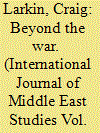

|
|
|
|
|
| Publication |
2010.
|
| Summary/Abstract |
This article seeks to address how Lebanese youth are dealing with the legacy of civil war (1975-90), given the national backdrop of official silence, persisting injustice, and competing memory discourses. Drawing on Marianne Hirsch's concept of postmemory, it explores the memory of a generation of Lebanese who have grown up dominated not by traumatic events but by narrative accounts of events that preceded their birth. This residual form of memory carries and connects with the pain of others, suffusing temporal frames and liminal positions. The article examines how postmemory is mediated and transformed through the mnemonic lenses of visual landscapes and oral narratives. Consideration is given to the dynamic production of "memoryscapes"-memories of violence localized in particular sites-and to narrative constructions of the past implicated in the ongoing search for meaning, historical truth, and identity. This article seeks to challenge pervasive notions of Lebanese postwar amnesia and of a generational detachment from the residual effects and future implications of war recollections.
|
|
|
|
|
|
|
|
|
|
|
|
|
|
|
|
| 3 |
ID:
124419
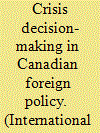

|
|
|
|
|
| Publication |
2013.
|
| Summary/Abstract |
In 1985 the Canadian government closed its embassy in Lebanon and opened a mission in Syria. This realignment occurred amid charges from Lebanon and the Lebanese diaspora in Canada that the government was abandoning Lebanon at the moment of its greatest need and rewarding the malevolent Ba'ath regime in Damascus. The Canadian Department of External Affairs, under the leadership of Secretary of State Joe Clark, risked political fallout from this controversy-such as outrage from Lebanese and Israeli diaspora communities in Canada, injured relations with Israel, Lebanon, and Syria, and partial responsibility for the deteriorating human security situation in Lebanon-in favour of protecting the Canadian embassy staff from escalating violence in Beirut and seizing the opportunity to open a long overdue diplomatic presence in Damascus, Syria, from which the hard-line Ba'ath party dominated much of the region's politics.
|
|
|
|
|
|
|
|
|
|
|
|
|
|
|
|
| 4 |
ID:
119384
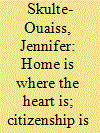

|
|
|
|
|
| Publication |
2013.
|
| Summary/Abstract |
In a country with a history of conflict, Lebanese not only have long sought emigration as a means of improving their safety and prosperity but also have sought out second passports as 'safeguards' to be used when things got rough at home. Little has been done on how Lebanese view these 'second passports' and the actual citizenship that comes with them. This article seeks to tackle this topic through analysing interviews of 10 Lebanese citizens who also hold European citizenship through naturalisation. How these Lebanese view their European citizenships will be described before turning to discussion of how this may affect the understandings of citizenship in Europe. The article concludes by looking on how the understandings of citizenship in liberal democracies in Europe on the part of citizens who normally reside outside of the state and who obtain citizenship as a 'safety' option may affect the broader understandings of citizenship in these countries.
|
|
|
|
|
|
|
|
|
|
|
|
|
|
|
|
| 5 |
ID:
095115
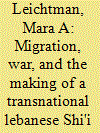

|
|
|
|
|
| Publication |
2010.
|
| Summary/Abstract |
The July 2006 Lebanon war was an important turning point for West African Lebanese. For the first time since their formation as a community, the Lebanese in Senegal organized a demonstration in Dakar displaying solidarity with Lebanon. This protest illuminates the dynamics between global forces and local responses. Hizbullah's effectiveness in winning the international public opinion of both Sunni and Shi?i Muslims in the war against Israel led to a surge in Lebanese diaspora identification, even among communities who had not been similarly affected by previous Lebanese wars. By analyzing the role of a Lebanese shaykh in bringing religious rituals and a Lebanese national identity to the community in Senegal, this article explores how members of the community maintain political ties to Lebanon even when they have never visited the "homeland" and sheds new light on the relationship among religion, migration, and (trans)nationalism.
|
|
|
|
|
|
|
|
|
|
|
|
|
|
|
|
| 6 |
ID:
095109
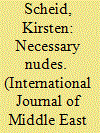

|
|
|
|
|
| Publication |
2010.
|
| Summary/Abstract |
In his studio in Beirut in 1929, the young artist Moustapha Farroukh (1901-57) envisioned a composition to change his society. He hoped his oil painting would incite broad support among his fellow Lebanese for a revolution in conventional gender relations and women's participation in the urban social order. He titled the picture The Two Prisoners and based it on a European convention for representing the East: the Nude odalisque (Figure 1). The resulting painting exemplifies the complex role Arab intellectuals of the early 20th century played in the formation of modern art and universal modernity. Leading artists in Mandate-era Beirut felt compelled to paint Nudes and display them as part of a culturing process they called tathq?f (disciplining or enculturing). To a large extent, tathq?f consisted of recategorizing norms for interaction and self-scrutiny. Joseph Massad has revealed that one crucial component of tathq?f was the repudiation of behaviors and desires associated with the Arab Past, such as male homosexuality. An equally important component was the cultivation of "modern," "masculine" heterosexual eroticism and a dutiful feminine compliance associated with ?ad?tha (novelty) and mu???ira (contemporaneity). This was accomplished through the use of a genre that was deliberately new and alien in both its material media and its impact on makers and viewers.
|
|
|
|
|
|
|
|
|
|
|
|
|
|
|
|
|
|
|
|
|